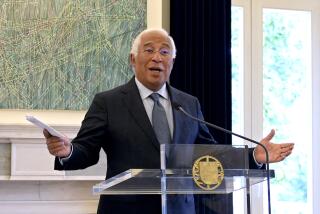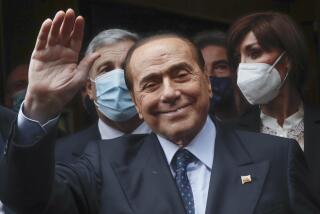Italian Leader Patches Holes in Cabinet : Politics: Amato names three to replace ministers implicated in corruption scandal sweeping the country.
- Share via
ROME — Prime Minister Giuliano Amato patched together a new Cabinet on Sunday, prolonging the life of his besieged government without addressing an underlying crisis of public confidence in the unraveling Italian political system.
After a weekend of negotiation climaxed by a stormy four-hour Cabinet meeting, Amato replaced three Cabinet ministers to complete his government in time for this morning’s financial market opening. The lira staggered Friday after Amato’s ministers of finance and health quit, both tainted in political corruption scandals that are engulfing Italian political parties.
More than 120 prominent political figures and businessmen have been arrested in Milan alone in the scandal, and about 150 members of the 630-member Parliament have received formal notification that they are under investigation.
Finance Minister Giovanni Goria, a former prime minister, and Health Minister Francesco De Lorenzo left office Friday, protesting their innocence, as Justice Minister Claudio Martelli had done nine days earlier. In the interim, former Prime Minister Bettino Craxi, informed that he is under investigation in half a dozen separate inquiries, lost his job as Socialist Party leader.
A spiraling, year-old investigation begun by young magistrates in Milan has uncovered an apparently nationwide system of institutionalized corruption that reached astonishing proportions.
One recent study estimates its cost at $10 billion to $20 billion since 1980. The newspaper Corriere della Sera on Sunday detailed known payoffs in the Milan and Rome regions alone of $480 million and estimated the overall total at around $1.2 billion.
In the most straightforward instances of what Italians call tangenti, businesspeople and builders illegally paid off political parties in exchange for public contracts. Variations on the theme include major-league fraud, vote-buying and a good deal of individual theft.
Goria has been named in an inquiry over funding for a hospital that was never built in his home-town of Asti. De Lorenzo quit after being advised he was a target in the investigation of a jobs-for-votes scandal.
Virtually every political party in Italy has been tarred by the scandals, but worst hit have been Amato’s Socialists and the Christian Democrats, dominant members of Italy’s 51 governments since World War II.
In the scandals’ wake, public revulsion with the political process in Italy is at unprecedented levels. Unless Parliament acts before then, referendums this spring will likely overturn the current electoral system under which political parties have grown fat on power corruption.
In seeking to avoid a full-blown governmental crisis, Amato sought to broaden his coalition by incorporating the former Communists of the Democratic Party of the Left. It would have marked the first participation in government by the party that was once the largest Communist party in the West, but party leaders rebuffed Amato’s overtures.
So did former allies of the small Republican Party, leaving Amato to rebuild his Cabinet around the Christian Democrats and Socialists with the small Liberal and Social Democratic parties.
Socialist Franco Reviglio, previously budget minister, was made finance minister replacing Goria. Christian Democratic deputy Beniamino Andreatta, an economist, gets Reviglio’s old job. Liberal Raffaele Costa was named health minister. He had previously been a minister without portfolio responsible for regional affairs.
With scandal investigators in full cry and new summonses falling on big-name politicians almost every day, how long Amato’s new patchwork Cabinet can rule is anybody’s guess.
More to Read
Sign up for Essential California
The most important California stories and recommendations in your inbox every morning.
You may occasionally receive promotional content from the Los Angeles Times.













